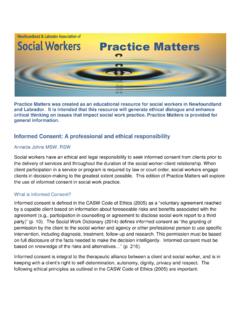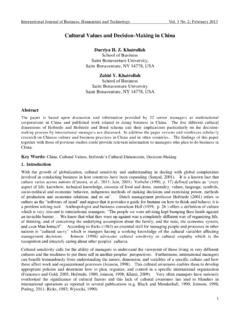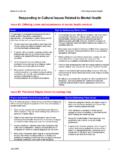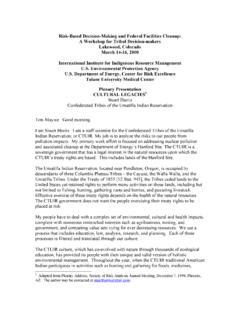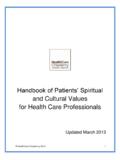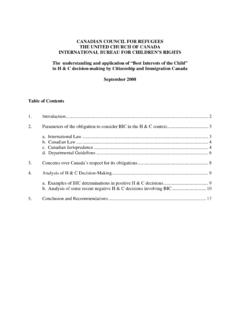Transcription of Ethical Decision-Making in Social Work Practice - | …
1 Ethical Decision-Making in Social work Practice September 2015. NLASW Professional Issues Committee Ethical Decision-Making Framework Introduction - Ethical Decision-Making and Social work Practice The CASW Code of Ethics (2005) sets forth the values and principles that guide Social work Practice in Newfoundland and Labrador. Social workers uphold the following core values: value 1: Respect for the inherent dignity and worth of persons value 2: Pursuit of Social justice value 3: Service to humanity value 4: Integrity in professional Practice value 5: Confidentiality in professional Practice value 6: Competence in professional Practice Ethical behaviour comes from a Social worker's individual commitment to engage in Ethical Practice .
2 Both the spirit and the letter of this Code of Ethics will guide Social workers as they act in good faith and with a genuine desire to make sound judgements . CASW Code of Ethics (2005). Ethical Decision-Making is an integral part of Social work Practice . On a daily basis, Social workers are faced with Ethical dilemmas that require thoughtful reflection and critical thinking. An Ethical dilemma is a choice between two actions based on conflicting professional values;. both may be morally correct and professionally grounded. Both may be right or good. It is this ambiguity that creates the dilemma for the Social worker (Linzer, 1999). As Social workers grapple with Ethical issues in Practice , a review and reflection on the CASW.
3 Code of Ethics (2005) and Guidelines for Ethical Practice (2005) is crucial. In addition, Social workers may find other strategies and resources helpful, including peer consultation, discussion with a supervisor/manager, review of best practices and relevant standards, use of Ethical Decision-Making models and ethics consultations. This guide, which is grounded in the CASW Code of Ethics (2005) and professional literature, is intended as a resource for Social workers to use as they navigate Ethical complexities in Practice and make sound Ethical decisions. An Ethical Decision-Making model is outlined and the document covers areas where critical thought and reflection is encouraged.
4 The material can be incorporated into discussions with peers, managers and supervisors, and can be used by Social workers providing field instruction to Social work students. 1. Components of Ethical Decision-Making The resolution of Ethical dilemmas in Practice is rarely black and white. As a profession we have come to appreciate uncertainty and ambiguity. We embrace the opportunity to step back and reflect on Ethical dilemmas from different vantage points. Antle (2005) developed a model outlining the components of Ethical Decision-Making that Social workers may find helpful as a reflective framework. Risk Tolerance When resolving Ethical dilemmas in Practice , risk tolerance is a concept that should be incorporated.
5 Risk tolerance can be defined as one's comfort level with risk. This includes risk for oneself and on behalf of another ( clients) to achieve a goal or purpose. As professionals we can make arguments for and against risk; from no risk to high risk. Our tolerance for risk, which is part of the broader Ethical framework, can fall along this continuum. It might be helpful to reflect on the following questions as they pertain to specific Ethical dilemmas in Practice : What factors primarily inform my tolerance for risk? Is my personal and professional tolerance for risk similar or different? How comfortable am I with uncertainty and ambiguity? Am I guided by deontological principles (rules) or utilitarian principles (consequences)?
6 What other theories inform my Practice ? 2. Are there times when my risk tolerance may have been too high? Too low? What were the contributing factors? Ethical Decision-Making Model Social workers are encouraged to use Ethical Decision-Making models that promote critical thinking and reflection. A multitude of Ethical Decision-Making models exist. The following model, or Ethical Decision-Making steps, is an accumulation of aspects from the models included in the literature and is based on a best Practice approach. Social workers may find this helpful in working through Ethical dilemmas in Practice . 1) What is the Ethical dilemma? Clearly articulate the professional values that are in conflict.
7 What personal values if any may be influencing my decision making ? Is there a conflict between my personal and professional values? 2) What is my immediate reaction or instinct for the best way to address the Ethical dilemma? 3) Consult the CASW (2005) Code of Ethics and Guidelines for Ethical Practice . Does the Code provide direction and guidance? Identify the sections from the Code of Ethics and Guidelines for Ethical Practice that are applicable to the dilemma. 4) Consult applicable agency policies and best Practice standards ( , NLASW. Standards for Technology Use in Social work Practice ). 5) Are there legal considerations? Consult relevant legislation where necessary.
8 6) What are some of the cultural considerations? 7) Was this issue addressed through informed consent? 8) What are some of the available options or choices for resolving the dilemma? Analyze the risk and benefits of each option. What steps do I need to take to minimize risk and not compromise my Ethical responsibilities? 9) Consultation with a peer, manager or supervisor can be extremely helpful. 10) Does the context of Practice make a difference? 11) Discuss the dilemma with the client where appropriate. 12) Consider the impact on the therapeutic relationship. 13) What other resources might be helpful in my Decision-Making ? 14) Document the Ethical Decision-Making process.
9 For additional information refer to the NLASW Standards for Social work Recording (2014). 15) Monitor and evaluate the impact of the decision and modify if necessary. Ethical Princies Screen 3. When consulting the Code of Ethics, there may be times when the Code will not specifically address the dilemma, or when the Code provides conflicting guidance. In these instances, Social workers may find it helpful to use the Ethical Principles Screen developed by Dolgoff, Loewenberg, & Harrington (2005). Protection of Life Equality and inequality Autonomy and freedom Least harm Quality of Life Privacy and Confidentiality Truthfulness and full disclosure The Ethical principles screen involves the ranking of Ethical principles.
10 For example, in this model, the protection of life supersedes privacy and confidentiality. As with any Ethical Decision-Making tool, Social workers must use professional judgment when using these tools and consult with a colleague or supervisor as needed. For a detailed description of the Ethical Principles Screen, please see Dolgoff, Loewenberg, & Harrington (2005). Ethical decisions for Social work Practice . Thomson Brooks/Cole. Critical Reflection and Professional Judgment Social work is a multifaceted profession. As professionals, Social workers are educated to exercise judgement in the face of complex and competing interests and claims. Ethical decision - making in a given situation will involve the informed judgement of the individual Social worker (CASW 2005, p.)


